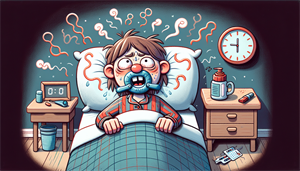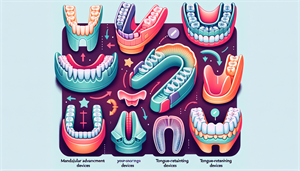Experiencing jaw pain from snoring mouthpiece use is a common issue many face. This article will explain why these devices cause discomfort and provide practical solutions to help you manage and alleviate this pain.
Key Takeaways
-
Snoring mouthpieces can cause jaw pain and TMJ disorders due to unnatural jaw positioning and strain on the temporomandibular joint.
-
Common side effects of anti-snoring devices include jaw pain, tooth pain, dry mouth, and potential misalignment of the bite.
-
Proper fitting, gradual adjustment, and jaw exercises are crucial strategies for managing and preventing jaw pain associated with snoring mouthpieces.
Why Do Snoring Mouthpieces Cause Jaw Pain?

Snoring mouthpieces, also known as mandibular advancement devices (MADs), are designed to hold the lower jaw forward during sleep to prevent airway obstruction. These devices create more airway space by positioning the jaw forward, effectively reducing snoring and alleviating obstructive sleep apnea symptoms. However, this forward positioning can put significant strain on the jaw muscles and the temporomandibular joint (TMJ).
The additional forces exerted on the jaw can lead to various issues, including TMJ disorders, which are a common cause of jaw pain. The temporomandibular joint, responsible for the movement of the jaw, can become strained and overworked due to the unnatural positioning required by snoring mouthpieces. This strain can cause discomfort and pain, particularly if the device is not properly adjusted.
Another factor contributing to jaw pain is the potential misalignment of the jaw caused by these devices. When the jaw is held in a forward position for extended periods, it can interfere with the natural bite alignment, leading to pain and discomfort. Over time, this misalignment can exacerbate existing issues or create new problems, contributing to temporomandibular disorder (TMD), a condition associated with pain and difficulties in the jaw.
Understanding these causes is the first step towards mitigating the discomfort associated with snoring mouthpieces. Recognizing how these devices impact the jaw allows users to take proactive measures for a more comfortable and pain-free experience.
Common Side Effects of Anti-Snoring Devices

While snoring mouthpieces can be effective in reducing snoring and treating obstructive sleep apnea, they are not without their side effects. One of the most frequently reported issues is jaw pain or soreness. This discomfort is often due to the strain placed on the jaw muscles and joints by the device.
In addition to jaw pain, users may experience other adverse effects such as tooth pain and dry mouth. These symptoms can arise from the constant pressure exerted by the mouthpiece on the teeth and gums, leading to dental soreness and even gingivitis in some cases. Changes in bite and the shifting of teeth are also potential risks, particularly with prolonged use of anti-snoring devices.
It’s essential for patients to communicate any side effects they experience with their dentist. Prompt communication can help in adjusting the device to alleviate discomfort and prevent further issues. Regular check-ups and adjustments are crucial to ensure the mouthpiece continues to fit correctly and function effectively.
Those experiencing significant side effects may need to explore alternative options or modifications to their current device. Understanding these common side effects and staying vigilant about their symptoms can help users manage and mitigate any discomfort associated with their anti-snoring device.
Identifying Temporomandibular Dysfunction (TMD) from Snoring Mouthpieces
Temporomandibular dysfunction (TMD) is a condition that can arise from the use of snoring mouthpieces, particularly if they are not properly fitted or if the user has pre-existing temporomandibular joints issues. One of the hallmark symptoms of TMD is the presence of clicking or popping sounds when moving the jaw. This can indicate that the joint is not moving smoothly and may be under strain.
Difficulty in chewing is another common sign of TMD, often resulting from jaw misalignment caused by the mouthpiece. This misalignment can make it challenging to bite and chew food properly, leading to increased discomfort and pain. Persistent jaw pain and tmj pain, which do not subside with regular use of the device, are clear indicators that TMD may be present.
The use of oral appliances to secure airflow during sleep can sometimes lead to unwanted side effects, including discomfort and pain. If the fit of the anti-snoring appliance is inadequate, it can cause unwanted jaw movements, exacerbating existing TMJ conditions and leading to TMD.
Recognizing these symptoms early and consulting with a dental sleep medicine specialist can help in diagnosing and managing TMD effectively. Proper diagnosis and treatment are essential to prevent long-term damage and ensure continued comfort while using snoring mouthpieces.
Preventing and Managing Jaw Pain from Snoring Mouthpieces

Preventing and managing jaw pain from snoring mouthpieces involves a combination of proper fit, gradual adjustment, and exercises. Ensuring the mouthpiece is correctly fitted can significantly reduce discomfort and prevent unnecessary strain on the jaw. Regular follow-up visits are crucial for adjusting the oral appliance to achieve optimal fit and comfort.
Patients with concerns about their oral appliance should discuss them with a sleep apnea specialist to receive personalized advice and adjustments. Implementing a gradual adjustment period allows the jaw muscles to adapt to the new position, minimizing the risk of pain and discomfort.
Additionally, incorporating jaw exercises and relaxation techniques can help alleviate tension and strengthen the muscles, further preventing pain.
Proper Fit and Customization
A proper fit is paramount in preventing jaw pain from anti snoring mouthpieces. Many anti-snoring devices, like the CustMbite Snoring System, offer 100% customizable designs to fit the unique shapes of users’ mouths. Devices such as the SmartGuard RX and the SnoreRx mouth guard feature adjustable trays and increments, allowing for a personalized fitting.
The myTAP Oral Appliance is another notable option, known for its ability to be remolded for adjustments and has an adjustment range of up to 22mm. A properly fitted mouthpiece aligns the jaw naturally, which helps prevent unnecessary tension and discomfort.
Inappropriate adjustments can lead to increased jaw tension and subsequently, pain. Custom-fit mouthpieces, adjustable in 1mm increments, enhance comfort and help mitigate jaw pain. Ensuring the mouthpiece is tailored to the user’s specific needs can make a significant difference in comfort and effectiveness.
Gradual Adjustment Period
A gradual adjustment period is essential for allowing the jaw muscles to adapt to the new position imposed by the mouthpiece. Adjusting the usage time gradually can help the muscles become accustomed to the device, reducing the risk of discomfort.
Gradually increasing the time of usage allows the jaw muscles to become accustomed to the new position imposed by the mouthpiece. Excessive use of oral appliances may cause fatigue in jaw muscles, so it is important to monitor comfort and adjust the usage schedule accordingly during the adjustment period.
Most patients find that a gradual increase in usage time, starting with shorter periods and working up to the whole night, helps in adapting to the device without significant discomfort. This approach ensures that the jaw muscles are not overworked and can adjust naturally.
Jaw Exercises and Relaxation Techniques
Incorporating jaw exercises and relaxation techniques can significantly help in managing and preventing jaw pain. Relaxation techniques such as deep breathing and gentle stretching can help alleviate tension in the jaw. Applying a warm compress to the jaw area can enhance relaxation and reduce pain.
Jaw exercises like opening and closing the mouth slowly can reinforce muscle strength and flexibility in the soft tissues. Gently massaging the jaw muscles can relieve pain and improve circulation. Temporomandibular joint (TMJ) stretches can enhance mobility and alleviate discomfort.
It is recommended to perform these relaxation techniques and exercises multiple times a day for the best results. Consistency in practicing these exercises and relaxation techniques plays a crucial role in preventing and managing jaw pain. Regular practice can help maintain jaw health and ensure continued comfort while using snoring mouthpieces.
When to Consult a Dental Sleep Medicine Specialist

Despite taking preventive measures, there are times when professional help is necessary. Patients should seek a consultation if they experience persistent jaw pain despite using a mouthpiece. If ongoing issues with the oral appliance persist, discussing these problems with a dental sleep medicine specialist is crucial.
It is essential to consult a specialist if jaw pain continues while using a snoring mouthpiece. Oral appliance therapy must be prescribed by a physician to ensure proper treatment for sleep-related breathing disorders. Qualified dentists in dental sleep medicine are essential for safely providing oral appliance therapy.
Symptoms of TMD, such as sharp pain or a constant dull ache in the jaw area, facial pain, and fatigue in the cheeks or jaw, warrant professional consultation. Additionally, patients may report ear pain which can be associated with jaw misalignment, significant with TMD. Consulting a specialist ensures that any complications are addressed promptly and effectively.
Alternatives to Snoring Mouthpieces for Reducing Snoring
For those who find snoring mouthpieces uncomfortable or ineffective, several alternatives can help reduce snoring. Continuous positive airway pressure machines are widely used alternatives to treat snoring, providing continuous airflow during sleep. Positional therapy encourages sleeping on the side to reduce snoring, as this position helps keep the airway open.
Adjustable beds can assist by elevating the head, preventing airway blockage during sleep. Lifestyle modifications, such as losing weight, have been shown to significantly decrease the frequency of snoring.
Surgical options like uvulopalatopharyngoplasty may be necessary in severe cases of snoring surgery. Each of these alternatives has its benefits and drawbacks, and it’s essential to choose the one that best fits the individual’s needs and circumstances. Consulting with a healthcare professional can help determine the most appropriate solution.
Summary
In summary, while snoring mouthpieces can be effective in reducing snoring and treating obstructive sleep apnea, they can also cause jaw pain and other side effects. Understanding the causes of this pain and implementing strategies to prevent and manage it is crucial for maintaining comfort and effectiveness.
By ensuring a proper fit, allowing for a gradual adjustment period, and incorporating jaw exercises and relaxation techniques, users can mitigate the discomfort associated with these devices. When necessary, consulting a dental sleep medicine specialist and exploring alternative options can provide additional relief and ensure a restful, pain-free sleep.
Frequently Asked Questions
Why do snoring mouthpieces cause jaw pain?
Snoring mouthpieces can cause jaw pain because they position the lower jaw forward, which may strain the jaw muscles and the temporomandibular joint. It’s essential to adjust or consult a professional if discomfort persists.
What are common side effects of anti-snoring devices?
Common side effects of anti-snoring devices include jaw pain, tooth pain, dry mouth, changes in bite, gingivitis, and dental soreness. It's important to monitor these effects and consult with a professional if they occur.
How can I prevent jaw pain from my snoring mouthpiece?
To prevent jaw pain from your snoring mouthpiece, ensure it fits properly, gradually adjust to wearing it, and incorporate jaw exercises and relaxation techniques. These steps can significantly enhance your comfort and alleviate discomfort.
When should I consult a dental sleep medicine specialist?
You should consult a dental sleep medicine specialist if you experience persistent jaw pain despite using a mouthpiece, as they can make necessary adjustments and provide appropriate treatment.
What are some alternatives to snoring mouthpieces?
CPAP machines, positional therapy, adjustable beds, lifestyle modifications, and surgical options are effective alternatives to snoring mouthpieces. Consider your situation to choose the best option for you.


